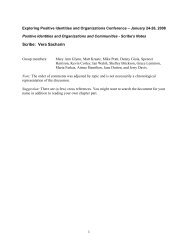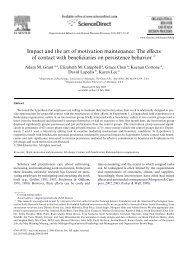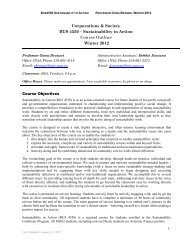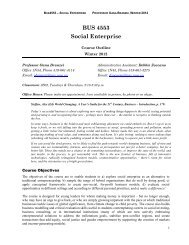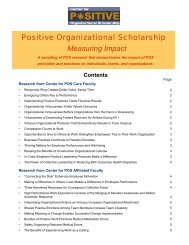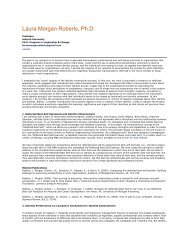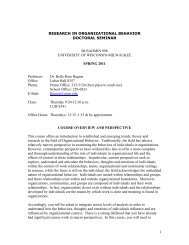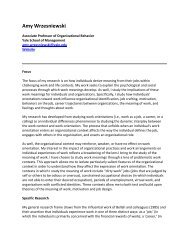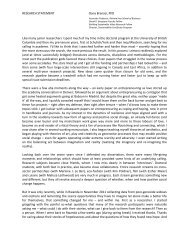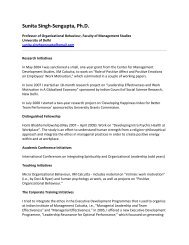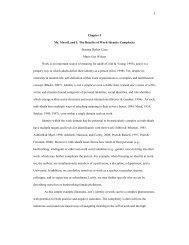Jeffrey Sanchez-Burks - Center for Positive Organizational Scholarship
Jeffrey Sanchez-Burks - Center for Positive Organizational Scholarship
Jeffrey Sanchez-Burks - Center for Positive Organizational Scholarship
You also want an ePaper? Increase the reach of your titles
YUMPU automatically turns print PDFs into web optimized ePapers that Google loves.
<strong>Jeffrey</strong> <strong>Sanchez</strong>-<strong>Burks</strong><br />
Assistant Professor of Management and Organizations<br />
University of Michigan<br />
jeffreysb@umich.edu<br />
Oceans, in a way, are like the diversity of people that inhabit their respective shores. From the<br />
Pacific to the Indian — they share a great deal in common, and yet have characteristics unique<br />
to each one. To focus on superficial characteristics — all oceans come in shades of blue/green —<br />
is to ignore more subtle, nonetheless powerful differences that distinguish them - the<br />
movements of their currents, the variation in their tides; differences that are essential to<br />
recognize if one wishes to navigate across them.<br />
One of the challenges to fostering positive dynamics in organizations where the work<strong>for</strong>ce<br />
increasingly reflects a mosaic of cultural diversity is learning how to manage this diversity. With<br />
this objective, traditional approaches in diversity research have focused on the influence of<br />
people’s demographic labels (e.g., Race, Gender), overlooking substantive differences in<br />
relational styles that different groups bring into the organization. A growing body of literature<br />
suggests that these substantive differences can be an even greater source of negative dynamics<br />
during intercultural contact. The flipside is that they may also provide clues about how to<br />
leverage this diversity to create a more inclusive and synergistic organizational culture.<br />
Moreover, studies also suggest that diverse teams and the people in them experience more<br />
positive outcomes when the unique perspectives and styles represented in the group are<br />
explicitly recognized rather than ignored or suppressed in an attempt to highlight superficial<br />
commonalities.<br />
Relational Styles Matter<br />
One of the lessons I have found in my research is that daily experiences as a participant in a<br />
particular cultural milieu shapes people’s beliefs about appropriate levels of attention to social<br />
emotional and relational elements in workplace relationships. These beliefs influence decisions<br />
about who would make a good boss, member of a team, and employee; who is considered<br />
professional and who is not. These beliefs also influence how much people attend to socialemotional<br />
rapport and <strong>for</strong>ms of face-saving communication in workplace relationships.<br />
Protestant Relational Ideology & American Workways<br />
A reoccurring finding in cross-cultural comparisons of relational work styles is a restricted focus<br />
on relational concerns in American culture. In contrast to societies as diverse as East Asian,<br />
Latin American, and the Middle East, American work patterns are characterized by an implicit<br />
and explicit preference <strong>for</strong> putting aside impersonal concerns in the workplace. Although this<br />
relational asceticism does not apply to interactions outside work, it can limit one’s ability to<br />
coordinate relational styles in cultural diverse organizations. This bias within mainstream
American culture toward restricting attention to relational styles (evidenced within<br />
organizations and researchers alike) may well contribute to the difficulty in generating positive<br />
outcomes out of cultural diversity. Research that addresses the theoretical and practical<br />
concerns about the complex ways culture and psychological processes influence interpersonal<br />
relations may be particularly useful in this regard.



